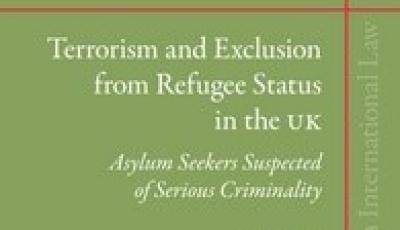Guest post by Yulia Ioffe, a DPhil candidate in Law, Faculty of Law, University of Oxford. Yulia’s research examines the institutional fragmentation of international law in the field of protection of asylum-seeking children.
Review of Terrorism and Exclusion from Refugee Status in the UK: Asylum Seekers Suspected of Serious Criminality by Sarah Singer (Brill, 2015)

Although the topic of terrorism is not new to international law, it is, in the words of Rosalyn Higgins, ‘a pernicious contemporary phenomenon,’ which still ‘presents complicated legal problems,’ including the questions of exclusion from refugee status. The 9/11 terrorist attacks on the United States, in particular, have prompted the rethinking of international law in this field. The United Nations, for instance, has responded to these problems by calling on states to ‘[e]nsure... that refugee status is not abused by the perpetrators, organizers or facilitators of terrorist acts.’ This has also led a number of states, including the UK, to reconsider their interpretation of Article 1F of the 1951 Convention relating to the Status of Refugees (Refugee Convention) in order to bring terrorism within the scope of the ‘exclusion clause.’
This course of events created a pretext that prompted Singer’s research, which looks at how terrorism has featured in the UK’s interpretation of Article 1F, and whether this interpretation has changed or developed over time (p. 3). The author starts the book with putting forward a statement, which she is going to test in later chapters, that there must have been a significant increase in the number of decisions in the UK of exclusion from refugee status of individuals suspected in terrorist activities (p. 4). The seemingly legitimate statement, first of all, is based on the absence of a universally accepted definition of terrorism in international law, which raises concerns of potential exclusion of genuine refugees from the protection of the Refugee Convention. Further, to reinforce these concerns, the UK has been at the forefront of mobilising support for the aforementioned UN resolution, calling for exclusion of terrorists from the refugee definition, and has introduced in domestic legislation a rather broad definition of terrorism in the interpretation of Article 1F(c). Interestingly, instead, Singer discovers that Article 1F decisions represent an extremely low percentage of the total number of asylum decisions made in the UK. And although the number of Article 1F cases with regard to suspected terrorists in the UK has increased within the last twenty years, the number of cases where the individuals have been excluded from refugee status remains small and has declined in the last four years (p. 240).
The arguments of the book are developed through seven substantive chapters. Chapter 1 opens with a useful introduction to the research and its methodology. The main doctrinal analysis is contained in Chapters 2 to 5. Chapter 2 investigates the overall approach of UK courts and tribunals to the interpretation of Article 1F and its compatibility with the rules of treaty interpretation under the Vienna Convention on the Law of Treaties, which are certainly very useful, but at times the analysis seems to excessively focus on the general rules of treaty interpretation under international law outside the context of the interpretation of Article 1F. Chapters 3 and 4 examine how terrorism features in each of the three limbs of Article 1F: ‘a war crime, or a crime against humanity,’ ‘serious non-political crime,’ and ‘acts contrary to the purposes and principles of the United Nations.’ Chapter 5 concentrates on the level of responsibility and the membership in a terrorist organisation required to give rise to Article 1F. Chapters 6 and 7 are primarily based on the empirical analysis of the application of Article 1F in practice.
To provide this unique overview of the application of Article 1F in the UK, Singer employs both qualitative and quantitative methodologies, drawing on a myriad of sources (although in a relatively small sample size), including questionnaires and interviews conducted with immigration judges and legal practitioners. Considering that the UK doesn’t currently publish comprehensive data on exclusion from refugee status under Article 1F, the last two chapters are particularly illuminating in terms of unfolding the practical side of the application of the exclusion clause.
The book in general very convincingly demonstrates that Article 1F hasn’t been used by the courts and tribunals in the UK as a de facto antiterrorist measure. Contrary to expectations, ‘terrorism’ for the purposes of the exclusion clause has been interpreted and applied in the UK narrowly and has been featured predominantly in Article 1F(c). In view of the ongoing refugee crisis and the growing fear of terrorism that continue to captivate international headlines, the book is exceptionally well-timed, and thus will be of considerable interest to a vast audience, including policy-makers, immigration judges, legal practitioners, and academics.
Any comments about this post? Get in touch with us! Send us an email, or post a comment here or on Facebook. You can also tweet us.
__________
How to cite this blog post (Harvard style):
Ioffe, Y. (2016) Book Review: Terrorism and Exclusion from Refugee Status in the UK. Available at: https://www.law.ox.ac.uk/research-subject-groups/centre-criminology/centreborder-criminologies/blog/2016/01/book-review-2 (Accessed [date]).
Share:








